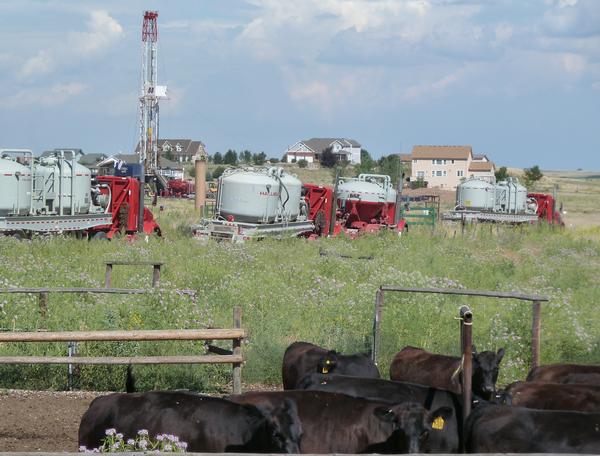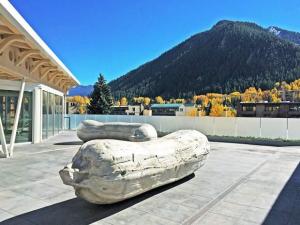PLATTEVILLE — Colorado's wave of gas and oil drilling is resulting in spills at the rate of seven every five days — releasing more than 2 million gallons this year of diesel, oil, drilling wastewater and chemicals that contaminated land and water.
At least some environmental damage from the oil-and-gas boom is inevitable, industry leaders and state regulators say, with a record-high 45,793 wells and companies drilling about eight more a day.
But a Denver Post analysis finds state regulators rarely penalize companies responsible for spills.
This year, the Colorado Oil and Gas Conservation Commission has imposed fines for five spills that happened three or more years ago. The total penalties: $531,350.
State rules obligate regulators to take a collaborative approach, negotiating remedies when possible rather than cracking down. In fact, the COGCC recently declared four companies responsible for the largest number of spills to be "Outstanding Operators" and lauded them for environmental excellence.
Oil and gas companies have reported 343 new spills this year, bringing the total since August 2009 to more than 1,000 spills, state data show.
Among the latest: Anadarko Petroleum subsidiary Kerr-McGee on Aug. 12, Aug. 22 and Aug. 24 spilled cancer-causing benzene at concentrations exceeding state standards by as much as 320 times, and other chemicals from corroded equipment near wetlands in Weld County. The spills contaminated groundwater and, in one case, the Boulder White Rock irrigation canal and South Boulder Creek.
Anadarko was one of the companies receiving state honors the week before the first spill.
"I nearly fell over, just couldn't believe it," said John Cox, 70, a retired Indiana Bell Telephone treasurer who in 2002 settled near Platteville. Since March, he has been urging state attention to Kerr-McGee's practices near his home.
According to spill data kept by COGCC regulators, Kerr-McGee has reported 97 spills over the past two years. Noble Energy had the most spills, 101, and also received a COGCC Outstanding Operator award.
Fast-changing landscape
On the prairie near Cox's home east of Platteville, a barren patch the size of two soccer fields surrounds Kerr-McGee wells. A Dumpster sits on the site, which was bulldozed a year ago. Thistles and weeds are invading. White drilling sands and a black splotch indicate spills.
"When companies are done, things ought to be battened down properly," said Cox, who favors increased domestic energy production as long as the environment is protected.
"It's just not fair for a company to go out there, change the topography and then walk away without putting it back."
His concerns reflect a wider uneasiness as drilling accelerates along Colorado's heavily populated Front Range.
For years, industry leaders and state partners have hailed Colorado's regulations as among the best in the nation.
Now, experts who helped craft those regulations question whether they'll be sufficient. For example, current rules allow drilling within 350 feet of subdivision homes and 300 feet of public drinking-water supplies — with no limits on drilling by streams.
The number of COGCC penalties for spills "sounds like a small number, when you've got 15 inspectors out there," said Mike Chiropolos, lands-program director for Western Resource Advocates, a law- and-policy group, who participated in development of the rules. "The penalties for violations need to be reviewed, and probably increased, to give companies an incentive to get on spills right away."
Chiropolos and others advocate tweaking rules to require baseline testing of water and soil before drilling, wildlife-protection plans, more inspectors to keep pace with industry expansion, and a ban on drilling inside municipal boundaries.
"There's a hope now that bringing drilling to the population centers of Colorado will encourage decisionmakers to err more on the side of public safety, health and welfare," said Frank Smith, organizing director of the Western Colorado Congress.
Industry leaders contend companies already are working diligently to minimize spills and say spills do not always lead to harm.
"Any spill is unacceptable, and when they happen we will address them immediately," said Tisha Schuller, president of the Colorado Oil and Gas Association.
However, industry groups oppose stricter regulations and are mobilizing to roll back existing protections.
The Denver-based industry group Western Energy Alliance recently issued a "blueprint" saying the West has the potential to produce more oil per day by 2020 than current daily oil imports from Russia, Iraq and Kuwait combined — but that "misguided government action is preventing achievement of the region's full energy potential."
Alliance officials declined to discuss spills.
Sorting out the numbers
The companies responsible for the most spills wield clout. For example, state records show Anadarko has contributed $43,450 since July 2010 to Colorado political groups and candidates, including $1,050 to John Hickenlooper's gubernatorial campaign. Other companies do likewise.
An analysis of spill data reported to COGCC regulators, and spill reports compiled by the Colorado Department of Public Health and Environment, found the following:
• Of the 343 spills reported this year through Sept. 2, Kerr-McGee had 38, Noble Energy had 37, and Williams Production and EnCana Oil and Gas each had 36. Next closest were Chevron and Petroleum Development Corp. with 29 each, followed by Pioneer Natural Resources with 22 and British Petroleum America with eight.
Noble, EnCana, Williams, Kerr-McGee and BP on Aug. 3 received COGCC awards — despite 374 spills among them since January 2010.
• Colorado groundwater was contaminated in 58 spills this year. Streams were contaminated 18 times. Spilled substances overflowed berms designed to contain spills 204 times.
• Among the spills reported to state health officials this year, about 54 were related to oil and gas operations and released about 2.1 million gallons of "produced water" extracted during drilling, along with gas and fracking fluids, diesel fuel, oil and other chemicals.
• Among spills reported by companies to COGCC regulators, the most occurred in Weld County, 114, followed by 55 in Garfield County, 34 in Las Animas County, 30 in Rio Blanco County and 12 in La Plata County.
• Since March 2007, Coloradans have submitted 1,000 complaints to state regulators asking for enforcement against companies.
• The COGCC has 15 inspectors who are charged with overseeing 45,793 wells. COGCC supervisors say 17,075 field inspections were done in 2010, up 71 percent from 9,991 inspections in 2009.
• COGCC enforcers scrambled this year to reduce a backlog of cases and say they're nearly ready to handle this year's spills.
Rewarding innovation
"Oil and gas development is an industrial activity. Like most such activity, it has environmental effects," COGCC director David Neslin said in a written response to questions submitted through a media gatekeeper.
Colorado's regulations are sufficient to "minimize adverse impacts to wildlife" and ensure the protection of public health and the environment, Neslin said. "At the end of the day, we require full reclamation of oil and gas sites."
The Outstanding Operator environmental awards presented Aug. 3 are based on broad criteria, including numbers of wells drilled and overall production, he said.
"We don't treat violations as a disqualification for those awards," Neslin said. "We believe that companies can, on the one hand, admittedly, violate our rules and be subject to enforcement and, on the other hand, do innovative things to protect the environment."
The new technology that companies deploy in expanding their operations along the Front Range "must protect our health and the environment," Neslin said. "This will require constant effort and improvement, not just to safeguard our water and air, but also to maintain public trust."
State records show the last time state regulators cited Kerr-McGee for a violation was in 2007. Company spokesman John Christiansen, in a prepared statement, said: "We are committed to high standards of environmental performance. We are very diligent in our reporting and adherence to all regulations, and we work with the state to ensure that any issues are thoroughly addressed."
Colorado's collaborative approach increasingly raises questions among Front Range residents as they watch more and more drilling rigs and service trucks roll across pastures and prairie.
Industry officials say they expect drilling to continue at least at its current pace of 3,000 new wells a year.
"It would be easy enough to coexist with them if companies carefully abided by the rules — all the better if they sign surface-use agreements — at the current level of activity," Cox said, checking out wellheads last week near his home.
"But, if the drilling accelerates much beyond what it is now, it will be hard to live with."
Bruce Finley: 303-954-1700 or bfinley@denverpost.com


 Font Resize
Font Resize




Article Comments